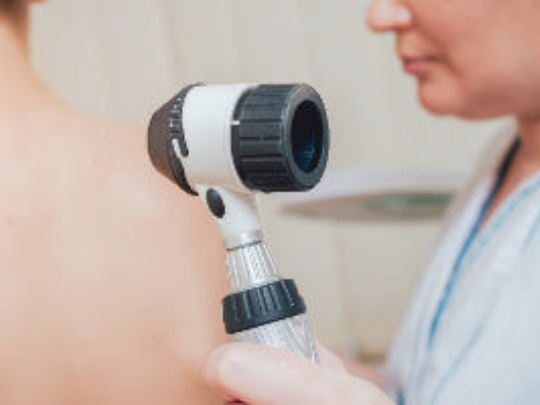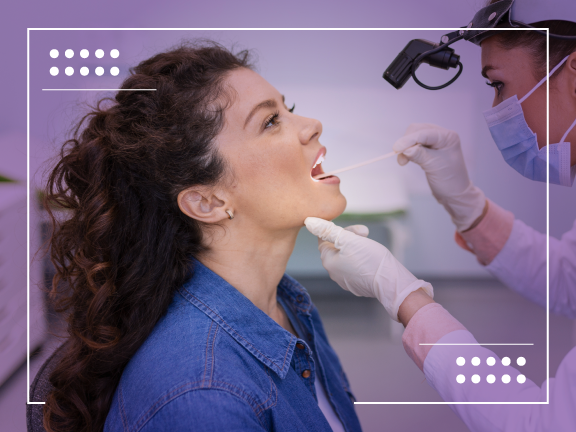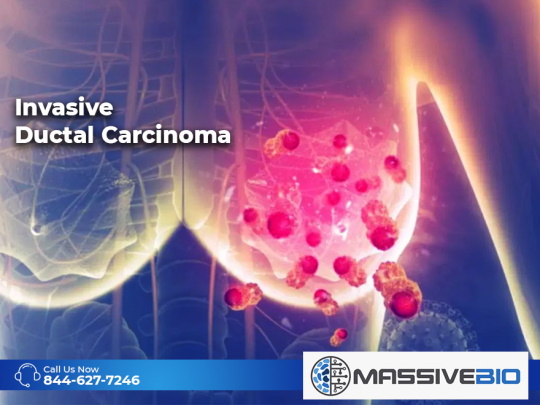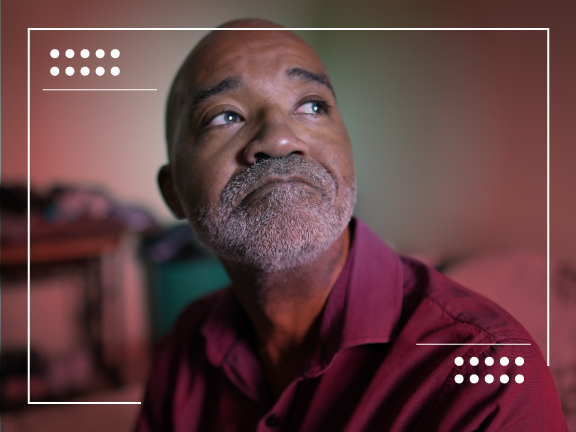What is Skin Cancer?
Skin cancer occurs when malignant cells form in the layers of tissue within the skin. Skin cancer is the most commonly diagnosed cancer type in the United States. However, most cases of skin cancer can be cured. Many patients recognize changes in their skin and then go see a doctor so it is important to self-check yourself periodically to catch anything in the early stages.
The types of skin cancer are squamous cell carcinoma, which is the most common, basal cell carcinoma, and melanoma. Each of these cancers represent the three kinds of skin cells that make up the epidermis. There are more than 9,000 cases of skin cancer diagnosed every day. Skin cancer can occur anywhere, but most often they occur in areas of the body that are exposed to the sun like the face, arms, neck, and hands.
Skin Cancer Symptoms
The symptoms that patients experience depend on the exact type of skin cancer they have. Specifically, the signs & symptoms of basal cell carcinoma are:
- Scabbing sore that bleeds, heals, and returns
- Flesh or brown colored lesion
- Pearly or waxy bump
Signs and symptoms of squamous cell carcinoma may include:
- Lesion with crusted, scaly surface
- Firm red nodule
Melanoma signs and symptoms are:
- Brown spot filled with dark speckles
- An existing mole that has changed in size, color, texture, or is bleeding
- Painful lesion with burning or itching sensation
- Dark lesions on spots without sun exposure like lining of the mouth, toes, palms, or soles of feet.
What Causes Skin Cancer?
There are many factors that can attribute to the development of skin cancer. Skin cancer occurs when mutations occur in the DNA of a skin cell. Eventually, the skin cell will grow out of control and a mass will develop of the cancer cells. Skin cancer occurs in the epidermis, the thin outer layer of skin. The type of skin cancer depends on which cells of the skin are affected out of the squamous cells, basal cells, and melanocytes.
Skin Cancer Risk Factors
The known risk factors of skin cancer include:
- Exposure to ultraviolet rays
- Natural or artificial sunlight exposure over long periods of time
- Weakened immune system
- Past radiation treatment
- Having fair skin or moles
- Skin that freckles and burns easily
- Skin that does not tan properly
- Blue or green colored eyes
- Blonde or red hair
- Family history of melanoma
Even if you don’t have any of these risk factors present, skin cancer can still develop and prevention methods like sunscreen and avoiding direct sun exposure should still be utilized. Anyone can develop skin cancer over time, but if risk factors are present you should be checked yearly by your dermatologist.
Skin Cancer Prevention
Overtime anyone can develop skin cancer. Taking the proper steps can reduce your risk of cancer in the skin. These steps include:
- Using sunscreen regularly with an SPF of 15 or higher, even in cloudy weather
- Avoid using tanning beds to limit ultraviolet radiation to the skin
- Wear clothing that covers your skin when in direct sunlight including hats, pants, long sleeve shirts, etc.
- Chemopreventive agents such as Beta carotene, Isotretinoin, Selenium, and more.
- Self-check your skin for any irregular moles or other early signs of skin cancer and let your doctor know immediately
Talk with your doctor and dermatologist for other tips to help prevent skin cancer based on your individual case. New ways of preventing and treating skin cancer are being studied in clinical trials.
Skin Cancer Treatment
The treatment that skin cancer patients receive depends on several factors, but mainly the type of skin cancer and its location. There are many treatment options that are considered, and they include:
- Surgery to remove the skin cancer
- Radiation therapy
- Chemotherapy
- Photodynamic therapy shines a light onto the skin cancer and activates a drug to kill the cancerous cells
- Immunotherapy
- Targeted Therapy
- Chemical peel dissolves the top layer of the skin to kill remaining cancer cells
- Other drugs being evaluated in clinical trials are available for patients to receive
Skin Cancer Clinical Trials
There are approximately 1,085 clinical trials for skin cancer that are recruiting patients or active in the United States. With such an extensive list, many of them could be beneficial for you. Our team of oncology nurses and our artificial intelligence based clinical trial matching system will find the best option for you.
With just a few clicks, you can see your clinical trial matches now. Click here to use our advanced clinical trial match tool.
How Do We Help Skin Cancer Patients?
Massive Bio offers an independent cancer treatment analysis as well as clinical trial matching for skin cancer patients. Our patient relations coordinators work closely with patients to gather information on their current medical status, and then will provide a list of options from available cancer clinical trials close to your home.
We can also provide a comprehensive case analysis through our Virtual Tumor Board from cancer specialists. The Virtual Tumor Board (VTB) is comprised of highly specialized oncologists from nationally-recognized Cancer Centers of Excellence. In just 7-10 days after receiving your medical records, we can get you a treatment plan without having to travel far distances and use your valuable time.
Source:
https://www.cancer.gov/skin/patient/













